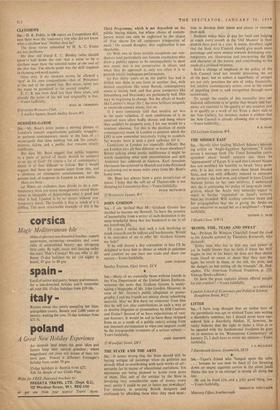DERRIERE-GARDE S111,—Mr. Bean's letter paints a moving picture of London's
concert organisations gallantly strugglin;
to perform contemporary music in the face of t:i avant-garde that does nothing but ask for compli- mentary tickets and a public that remains utterly indifferent.
But does Mr. Bean suggest that public response to a piece or period of music should be accepted as an act of God? Of course a lot of contemporary music is at first difficult to follow. But I would suggest that there are reasons apart from this, and a plethora of alternative entertainment, for the present lack of response in London to new music.
Here are three:
(a) When an orchestra does decide to do a con- temporary work too many managements reveal them- selves as incapable of determining what is good and what is bad. London is by no means without con- temporary music. The trouble is that so much of it is Piffling. The most remarkable example of this is the Third Programme, which h not dependent on the public buying tickets, but whose choice of contem- porary music can only be explained by the slogan of `Fair shares for all composers irrespective of merit.' On second thoughts, that explanation is too charitable.
(12) With two or three notable exceptions our con- ductors (and particularly our famous conductors who draw a public) appear to be unsympathetic to most new music that is not conservative in idiom; and when they do approach it, only too often it is to provide totally inadequate performances.
(c) For thirty years or so the public has had it drilled into them in one form or another that, with limited exceptions like some Bartok, contemporary music, is mainly bad; and that great composers like Schoenberg and Stravinsky are particularly bad. This may be beginning to change. But the effects of books like Lambert's Music Ho I, the most brilliant misguide to twentieth-century music, live on.
If I were constantly told that modern art was in the main valueless, if such exhibitions of it as occurred were often badly chosen and• hung where they couldn't be properly seen, I for one would be a constant absentee. Yet this is the position of much contemporary music in London (a position which the LPO is now somewhat tentatively trying to combat). No wonder there is such a poor audience for it.
Conditions in London are especially difficult. But are London ears all that different to those elsewhere? Before talking about public indifference it might be worth examining what with determination and skill Ansermet has achieved in Geneva, Karl Amadeus Hartmann has achieved in Munich and John Pritchard is achieving not so many miles away from Mr. Bean's home town.
Mr. Bean has always been a great proselytiser of music. I hope that the soft air of Thames-side is not damping his Lancastrian fires.—Yours faithfully,










































 Previous page
Previous page